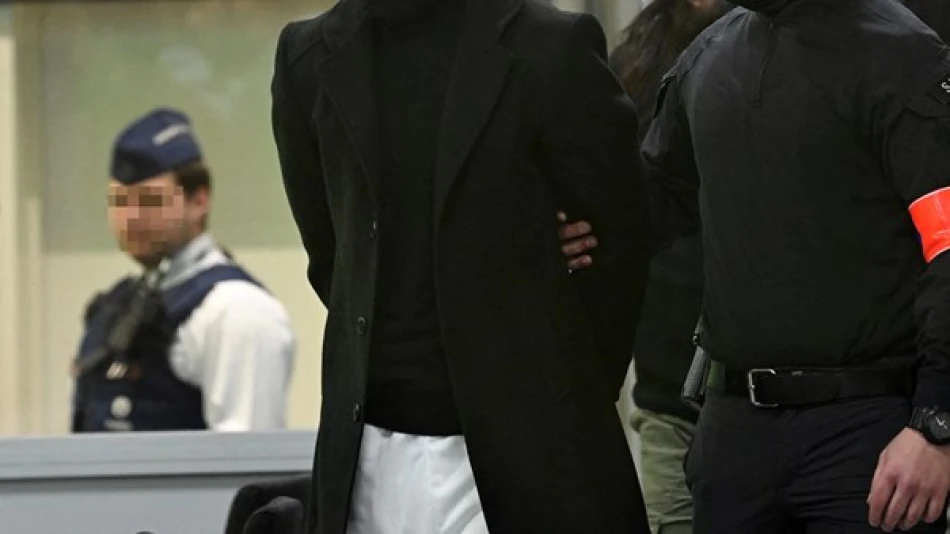
Life Sentence for Terrorist Convicted in Pilot Murder Case
Swedish Court Delivers Historic Life Sentence for ISIS Pilot Burning Case
A Swedish court has sentenced Osama Krayem to life imprisonment for his role in the brutal execution of Jordanian pilot Muath al-Kasasbeh, who was burned alive by ISIS in 2015. The landmark verdict represents the first time any court worldwide has prosecuted someone for this internationally condemned war crime, setting a precedent for European justice systems handling ISIS atrocities.
Groundbreaking Legal Precedent in War Crimes Prosecution
Judge Anna Lilienberg Gulisio of Stockholm District Court ruled that Krayem was "present at the execution site in military uniform and armed, agreed to be filmed, and contributed decisively to the victim's death." The court determined that while another individual physically ignited the fire that killed the pilot, Krayem's actions constituted substantial participation in the murder.
This case marks Sweden's emergence as a leader in applying universal jurisdiction principles to prosecute ISIS crimes. The Swedish legal system's willingness to pursue such complex international cases demonstrates Europe's evolving approach to handling foreign fighters who participated in terrorist activities abroad.
Video Evidence Proves Decisive
The prosecution relied heavily on video evidence from ISIS's own propaganda materials, which showed Krayem's presence and participation in the execution ceremony. This digital evidence trail has become increasingly crucial in prosecuting ISIS members, as the group's extensive documentation of its crimes now serves as evidence against surviving participants.
Family Seeks Justice Across Borders
Joudat al-Kasasbeh, brother of the murdered pilot, expressed satisfaction with the verdict, calling it "the harshest punishment possible in Europe" and stating it "somewhat heals our hearts as a family." The family's response highlights the ongoing struggle for justice faced by victims' relatives when perpetrators scatter across multiple jurisdictions.
The family's call for other nations to pursue similar prosecutions underscores a broader challenge: hundreds of ISIS members remain at large or imprisoned in various countries, with many cases still unprosecuted due to jurisdictional complexities and evidence-gathering difficulties.
Pattern of Terror Across European Cities
Krayem's conviction adds to his existing criminal record, which includes involvement in terrorist activities in Paris and Brussels. This pattern reflects the transnational nature of ISIS operations and the challenge European security services face in tracking individuals who move between cells and countries.
The defendant's history of "mass killings and terrorist operations against humanity," as described by the victim's family, illustrates how some ISIS operatives participated in multiple high-profile attacks across different theaters of operation.
Implications for International Justice
Sweden's successful prosecution could encourage other European nations to pursue similar cases against ISIS members within their borders. The verdict demonstrates that European courts can effectively handle complex terrorism cases involving crimes committed in foreign conflict zones, potentially reducing reliance on military tribunals or international courts.
The case also highlights the importance of preserving digital evidence from conflict zones. ISIS's extensive video documentation, initially intended as propaganda, has become a crucial tool for prosecutors seeking to establish individual culpability in mass atrocities.
Broader Impact on Counter-Terrorism Strategy
This conviction sends a clear message that participation in ISIS atrocities will face consequences regardless of where perpetrators eventually settle. For European governments grappling with returned foreign fighters, Sweden's approach offers a model for pursuing accountability through domestic courts rather than indefinite detention or deportation.
The life sentence also addresses public concerns about adequate punishment for terrorism-related crimes, potentially influencing how other European jurisdictions approach similar cases involving ISIS members who participated in the group's most notorious executions.
Most Viewed News

 Layla Al Mansoori
Layla Al Mansoori






